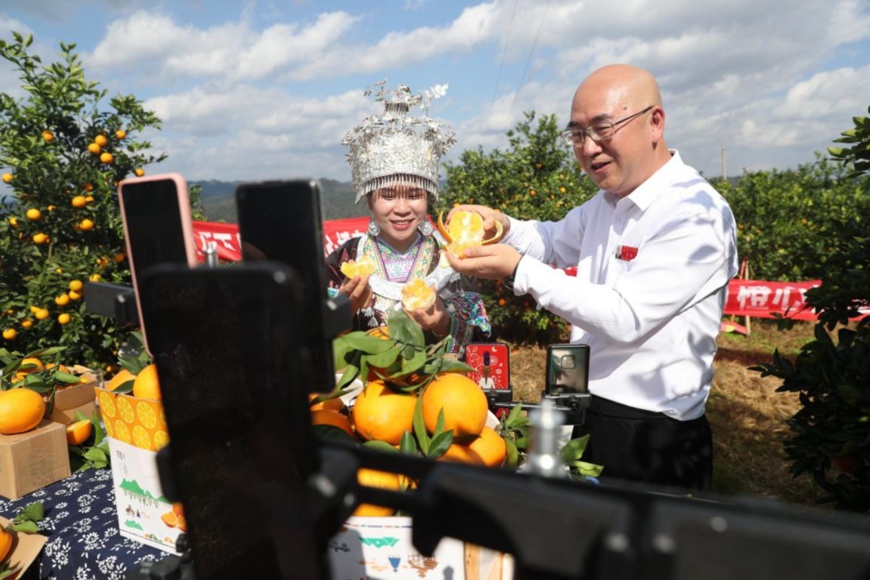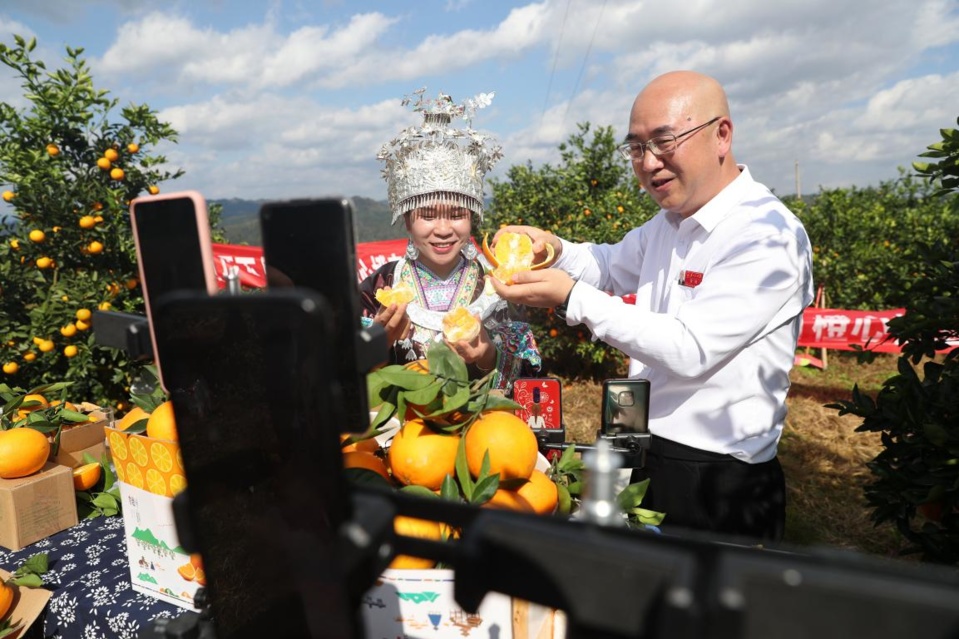By Xu Qing, People's Daily Online

Huang Jian (right), deputy mayor of Rongjiang County, southwest China's Guizhou Province, joins a livestream show to advertise local navel oranges, Nov. 18, 2020. (Photo by Yang Chengli/People's Daily Online)
Driven by influencer marketing, primary-level cadres in China are showing up on short video platforms to promote local specialties, as well as cultural and tourism resources, contributing a vital part to China's efforts to coordinate epidemic control and economic and social development, consolidate poverty alleviation achievements and vitalize rural regions.
Douyin, known as Tik Tok globally, has invited a total of 110 city and county mayors to livestream shows since February 2020. They helped sell 123 million yuan ($18.74 million) of agricultural products, over half of which were from impoverished counties.
Chen Canping is a deputy mayor of Anhua County, Yiyang, central China's Hunan Province known for its tea industry. His job is to reduce local poverty by e-commerce.
At the end of 2018, Chen opened an account on Douyin, and the sudden outbreak of COVID-19 a year later prompted him to join livestreaming e-commerce as a way to help local tea planters and enterprises tide over difficulties.
"In Anhua, the tea industry had lifted 96,000 people out of poverty. If tea sales becomes stagnant, tea farmers might slip back into poverty again," he said.
In around half a year, Chen joined over 300 livestream shows that generated a total sales volume of 15 million yuan. Now the deputy mayor has more than 400,000 followers on Douyin.
As of the end of last year, all 148,600 impoverished people and 130 impoverished villages in Anhui had been lifted out of poverty.
"Ms. Tang, it was because of you that I started to know Taihu County in Anhui." "Ms. Tang, it was because of your clips on Douyin that I decided to have a trip to Taihu County." These are comments that Tang Xiang, who serves as temporary deputy mayor of Taihu County, Anqing, east China's Anhui Province, always receives on Douyin.
To introduce Taihu to other parts of China and attract attention and investment to Taihu is a goal of Tang, who always appears in short videos to advertise the beautiful county wearing traditional Chinese costumes. Short videos have just won the county two investment projects totaling 300 million yuan from Nanjing, east China's Jiangsu Province and Huizhou, south China's Guangdong Province after this year's Spring Festival.
Shanyang County, located in the Qinling-Bashan mountainous regions of Shangluo, northwest China's Shaanxi Province, was once troubled with poverty. When Jin Xuehua was appointed to serve a temporary position in the county, he immediately conducted a survey on local e-commerce development. Surprisingly, he found that neither enterprises nor individual merchants there knew what influencer marketing was.
In early 2020, the county held training sessions for local e-commerce enterprises, and Jin also opened accounts on short video platforms. In less than a year, he helped sell over 13 million yuan worth of farm produce. The top sales volume of a single livestream show even exceeded what an enterprise would achieve in three months.
He said stereotyped contents don't work any longer today, adding that the viewers are more into down-to-earth and funny stuffs such as walnut harvesting and straw sandal weaving.
Besides, the products promoted must be of good quality, he said. "The commodities I promote are all produced by standardized production systems and authenticated by official platforms, so as to ensure interests for both farmers and consumers," he said.
Douyin, known as Tik Tok globally, has invited a total of 110 city and county mayors to livestream shows since February 2020. They helped sell 123 million yuan ($18.74 million) of agricultural products, over half of which were from impoverished counties.
Chen Canping is a deputy mayor of Anhua County, Yiyang, central China's Hunan Province known for its tea industry. His job is to reduce local poverty by e-commerce.
At the end of 2018, Chen opened an account on Douyin, and the sudden outbreak of COVID-19 a year later prompted him to join livestreaming e-commerce as a way to help local tea planters and enterprises tide over difficulties.
"In Anhua, the tea industry had lifted 96,000 people out of poverty. If tea sales becomes stagnant, tea farmers might slip back into poverty again," he said.
In around half a year, Chen joined over 300 livestream shows that generated a total sales volume of 15 million yuan. Now the deputy mayor has more than 400,000 followers on Douyin.
As of the end of last year, all 148,600 impoverished people and 130 impoverished villages in Anhui had been lifted out of poverty.
"Ms. Tang, it was because of you that I started to know Taihu County in Anhui." "Ms. Tang, it was because of your clips on Douyin that I decided to have a trip to Taihu County." These are comments that Tang Xiang, who serves as temporary deputy mayor of Taihu County, Anqing, east China's Anhui Province, always receives on Douyin.
To introduce Taihu to other parts of China and attract attention and investment to Taihu is a goal of Tang, who always appears in short videos to advertise the beautiful county wearing traditional Chinese costumes. Short videos have just won the county two investment projects totaling 300 million yuan from Nanjing, east China's Jiangsu Province and Huizhou, south China's Guangdong Province after this year's Spring Festival.
Shanyang County, located in the Qinling-Bashan mountainous regions of Shangluo, northwest China's Shaanxi Province, was once troubled with poverty. When Jin Xuehua was appointed to serve a temporary position in the county, he immediately conducted a survey on local e-commerce development. Surprisingly, he found that neither enterprises nor individual merchants there knew what influencer marketing was.
In early 2020, the county held training sessions for local e-commerce enterprises, and Jin also opened accounts on short video platforms. In less than a year, he helped sell over 13 million yuan worth of farm produce. The top sales volume of a single livestream show even exceeded what an enterprise would achieve in three months.
He said stereotyped contents don't work any longer today, adding that the viewers are more into down-to-earth and funny stuffs such as walnut harvesting and straw sandal weaving.
Besides, the products promoted must be of good quality, he said. "The commodities I promote are all produced by standardized production systems and authenticated by official platforms, so as to ensure interests for both farmers and consumers," he said.
 Menu
Menu
 Primary-level cadres in China join livestream e-commerce for poverty alleviation
Primary-level cadres in China join livestream e-commerce for poverty alleviation
















